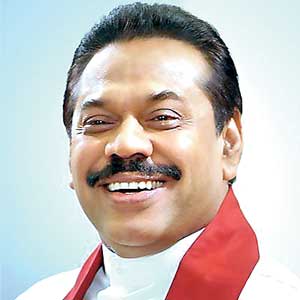Monday Feb 23, 2026
Monday Feb 23, 2026
Wednesday, 23 September 2015 01:20 - - {{hitsCtrl.values.hits}}
Former President of Sri Lanka Mahinda Rajapaksa yesterday called upon the Government to reject the Report of the UN High Commissioner for Human Rights (OHCHR) Investigation on Sri Lanka.
In a statement to media, the former President and current parliamentarian said his government did not cooperate with the OHCHR investigation for many reasons, mostly because it was instituted outside the established procedure of the UN Human Rights Council (UNHRC).
Rajapaksa elaborated that the usual procedure was for the President of the UNHRC to appoint a three-member independent panel to carry out the investigation after the relevant resolution is passed in the Council but the investigation on Sri Lanka was not carried out by an independent Commission of Inquiry but for the very first time, by the OHCHR.
The report of the OHCHR investigation was presented to the UNHRC in Geneva by UN High Commissioner for Human Rights Zeid Ra’ad al Hussein on September 16th.
Former President questioned the OHCHR’s independence because according to him, it is funded for the most part not through the regular budget of the UN but “through ‘voluntary contributions’ from the very Western states that sponsored the resolution against Sri Lanka.”
According to Rajapaksa, all the important staff positions in this body are held by Westerners who make up half the cadre of the OHCHR.
“Given the composition of the OHCHR, it would not be possible to expect an impartial inquiry from them,” he said.
The former President recalled that Pakistan and India also opposed the “intrusive” nature of the investigation suggesting that an “intrusive approach that undermines national sovereignty” is counterproductive.
Speaking of the speculation that the report may have been watered down because a new government has been elected to power, the former President said he doesn’t see the report as having been “watered down”.
He explained that since Sri Lanka is not a signatory to the Rome Statute under which the International Criminal Court (ICC) functions Sri Lanka cannot be taken before the ICC for a trial and the only way for a war crime tribunal is if the government cooperate voluntarily with the UN to set up a hybrid court as the OHCHR report suggested.
“What has been recommended in the OHCHR report is the only practical way in which a war crimes tribunal can be instituted in relation to Sri Lanka. So it is wrong to believe that this report has been watered down in any way,” he said.
Rajapaksa said he doesn’t share the view that the report was not bad as expected just because it did not mention any names.
He pointed out that on the contrary to the claims by some politicians that the risk of Sri Lankan military personnel being arrested in foreign countries for alleged human rights violations under universal jurisdiction has receded, there is a specific request made in the OHCHR report to member states of the UN to investigate and prosecute those allegedly responsible for war crimes.
MP Rajapaksa dismissed the claim that if his government is still in power the report may have led to economic sanctions being imposed on Sri Lanka saying that the neither the UNHRC nor the OHCHR can impose economic sanctions on a country.
He said many of the recommendations in the OHCHR report give cause for concern and requested the government to study the legal opinions on the law of armed conflict and humanitarian law and incorporate the views of the international lawyers, who were in the Presidential Commission of Inquiry on Disappearances, in any detailed response to the OHCHR report.